Vibra Energia Bundle
Can Vibra Energia Fuel Its Future Growth?
Vibra Energia, Brazil's energy giant, is charting a course beyond traditional fuel distribution. Formerly Petrobras Distribuidora, the company has undergone a significant transformation, evolving into a comprehensive energy provider. Its strategic shifts in the Vibra Energia SWOT Analysis are key to its future success.
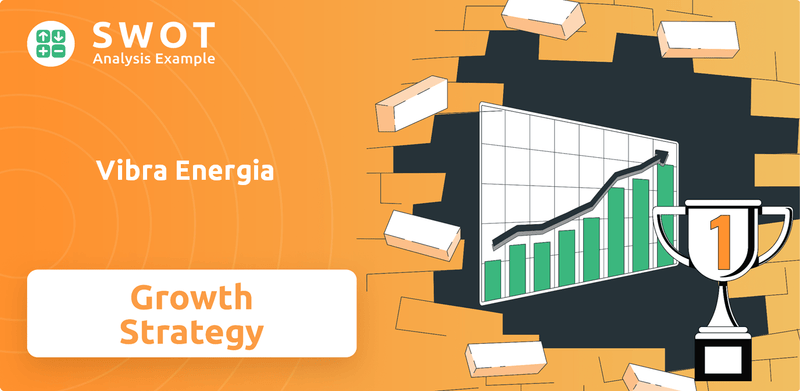
This article dives deep into Vibra Energia's ambitious growth strategy and future prospects within the dynamic Brazilian market. We'll examine its expansion plans, innovation in the energy sector, and financial outlook, providing actionable insights for investors and stakeholders. Understanding Vibra Energia's adaptation to the energy transition and its competitive positioning is crucial for anyone looking to navigate this evolving landscape.
How Is Vibra Energia Expanding Its Reach?
Vibra Energia's Growth Strategy is centered on expanding its operations and diversifying beyond traditional fuel distribution. The company is actively investing in the Energy Sector, particularly renewable energy, to capitalize on the evolving market dynamics. This strategic shift is designed to strengthen Vibra Energia's position in the Brazilian Market and ensure long-term sustainability.
The company's expansion initiatives are multifaceted, including acquisitions, partnerships, and internal developments. These efforts are aimed at increasing revenue streams, improving operational efficiency, and enhancing customer offerings. Vibra Energia's focus on innovation and strategic investments underscores its commitment to adapting to the changing energy landscape.
This chapter explores the key expansion initiatives of Vibra Energia, providing insights into its strategic moves and future prospects. It will delve into the company's investments in renewable energy, its expansion in the lubricants market, and its strategic partnerships, offering a comprehensive overview of Vibra Energia's growth trajectory.
Vibra Energia's acquisition of Comerc Energia is a cornerstone of its expansion strategy. This move is central to Vibra's strategy to diversify into renewable energy and electricity trading. The full acquisition of Comerc Energia, finalized in August 2024, significantly boosts Vibra's presence in the renewable energy sector.
The acquisition of Comerc Energia provides Vibra with access to 2.1 GW of renewable energy capacity. This capacity comes from solar and wind power facilities across Brazil. This expansion positions Vibra as a key player in the renewable energy market.
Comerc Energia is expected to contribute significantly to Vibra's financial performance. It is projected to contribute R$1.3 billion ($0.2 billion) to Vibra's EBITDA in 2025. The acquisition is also expected to generate R$1.4 billion ($0.2 billion) in synergies over two years.
Vibra is expanding its presence in the lubricants market through plant modernization and expansion. The modernization and expansion of its lubricant plant in Duque de Caxias, Rio de Janeiro, is expected to be completed by the end of 2024. This will make it the largest in Latin America and one of the five largest globally.
In the second quarter of 2024, Vibra's lubricant sales increased by 14% compared to the previous quarter, reaching 72,000 liters. In April 2025, Vibra introduced its new Lubrax Top Auto line of lubricants specifically for hybrid vehicles, compliant with the API SQ/ILSAC GF-7 specification.
- The expansion of the lubricant plant is aimed at increasing production capacity and improving product quality.
- The new Lubrax Top Auto line caters to the growing market for hybrid vehicles.
- The company's focus on the lubricants market is expected to drive growth in both retail and B2B segments.
- This strategic move supports Vibra Energia's diversification efforts.
Vibra Energia's strategic initiatives also include partnerships and new business models in natural gas and biofuels. The company's investments and partnerships are designed to enhance its market position and drive sustainable growth. For more details on the Vibra Energia's target market, you can read this article: Target Market of Vibra Energia.
Vibra Energia SWOT Analysis
- Complete SWOT Breakdown
- Fully Customizable
- Editable in Excel & Word
- Professional Formatting
- Investor-Ready Format
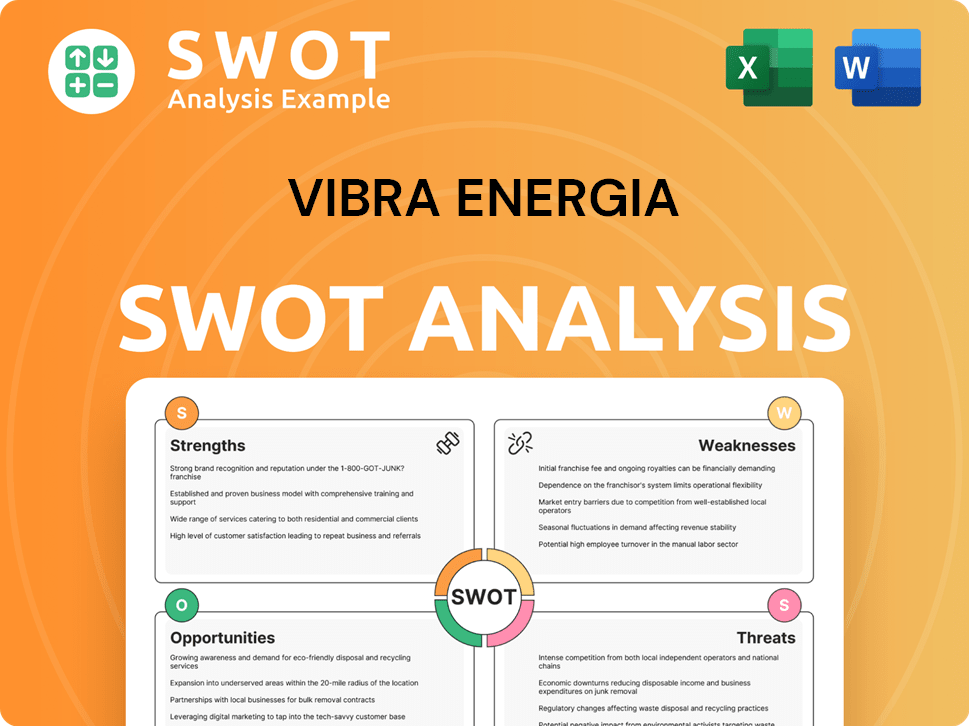
How Does Vibra Energia Invest in Innovation?
Vibra Energia is actively employing innovation and technology to propel its growth strategy and navigate the changing energy landscape. This approach is crucial for the company's future prospects, particularly in the dynamic Brazilian market. The integration of technological advancements is key to Vibra's expansion and adaptation within the energy sector.
A significant aspect of Vibra's strategy involves diversifying its portfolio into renewable energy and electricity trading. This move is heavily reliant on technological advancements, positioning the company to capitalize on emerging market opportunities. Vibra's commitment to sustainability initiatives is also deeply intertwined with its innovation strategy, driving the company's efforts to reduce its environmental impact and enhance operational efficiency.
The acquisition of Comerc Energia, with its 2.1 GW of renewable energy capacity, underscores Vibra's investment in clean energy technologies. This strategic step aims to capture emerging market opportunities in Brazil. Moreover, the company's focus on sustainability initiatives is deeply intertwined with its innovation strategy, including ambitious decarbonization goals and exploring technological solutions like electric trucks and fuels with higher renewable content.
Vibra's acquisition of Comerc Energia, which includes 2.1 GW of renewable energy capacity, is a key element of its growth strategy. This move positions Vibra as a leader in Brazil's sustainable energy transition.
Vibra aims to reduce Scope 1 and 2 greenhouse gas (GHG) emissions by 67% by 2026 and neutralize Scope 3 emissions by 2050. These goals drive the company's technological investments.
The company is experimenting with fuels that have higher renewable content, such as green diesel (HVO). This is part of its broader sustainability efforts.
Vibra plans to increase its electricity consumption from renewable sources in the free energy market, aiming to reach 50% in the next three years, up from approximately 35% currently.
The recent launch of the Lubrax Top Auto line for hybrid vehicles demonstrates Vibra's commitment to product innovation, driven by technological advancements in the automotive industry.
Vibra's ongoing digital transformation efforts are crucial to maintaining its competitive edge and contributing to Brazil's energy framework, optimizing operational efficiency and environmental responsibility.
Vibra Energia's innovation and technology strategy is multifaceted, focusing on renewable energy, sustainability, and digital transformation. This approach is essential for the company's growth strategy and future prospects in the energy sector.
- Renewable Energy Integration: Expanding renewable energy capacity through acquisitions like Comerc Energia and increasing the use of renewable electricity.
- Sustainability Initiatives: Setting ambitious decarbonization goals and investing in technologies like green diesel and electric trucks to reduce emissions.
- Product Innovation: Launching new products like the Lubrax Top Auto line for hybrid vehicles, adapting to market changes.
- Digital Transformation: Optimizing operational efficiency and environmental responsibility through digital initiatives.
- Market Adaptation: Continuously adapting to the evolving energy landscape and the growing adoption of electric and hybrid vehicles. The company's strategic moves are influenced by the Competitors Landscape of Vibra Energia.
Vibra Energia PESTLE Analysis
- Covers All 6 PESTLE Categories
- No Research Needed – Save Hours of Work
- Built by Experts, Trusted by Consultants
- Instant Download, Ready to Use
- 100% Editable, Fully Customizable
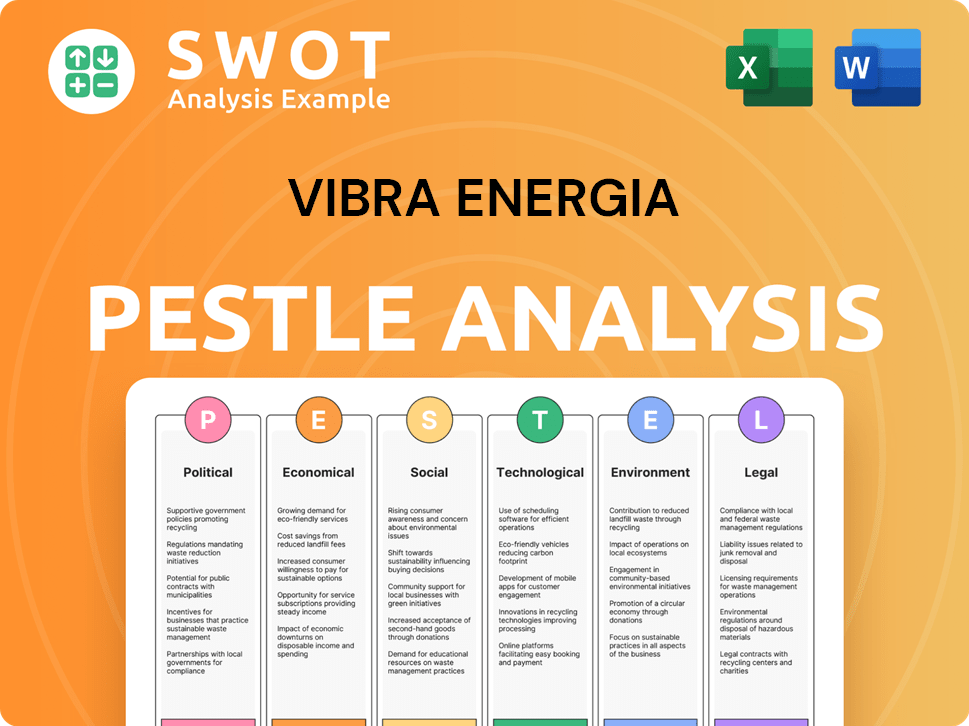
What Is Vibra Energia’s Growth Forecast?
The financial outlook for Vibra Energia reflects a strategic shift towards sustainable growth, balancing its established fuel distribution business with significant investments in renewable energy. For the full year 2024, Vibra reported a revenue of BRL 82 billion and a net income of BRL 1.65 billion. The company's ability to navigate the evolving energy landscape and capitalize on emerging opportunities is key to its future prospects.
In the 12 months ending March 2024, the company's revenue was BRL 163.5 billion with an EBITDA margin of 6%. Analysts project Vibra's revenue to reach BRL 172.3 billion in 2024, BRL 174.3 billion in 2025, and BRL 181.6 billion in 2026. This growth trajectory underscores the company's expansion plans in Brazil and its ability to maintain a strong presence in the energy sector.
While earnings are forecasted to decline by 69.3% in the current fiscal year, the long-term outlook suggests a reliable earnings development with an average annual growth of 24.4% over a 10-year period. This indicates a positive trajectory for investors interested in Vibra Energia investment opportunities.
The full acquisition of Comerc Energia is a key driver of future financial performance. Comerc is expected to contribute R$1.3 billion ($0.2 billion) to Vibra's EBITDA in 2025.
The acquisition is anticipated to generate R$1.4 billion ($0.2 billion) in synergies over three years. These synergies will primarily come from financial cost reductions and operational efficiencies.
Vibra expects its net debt leverage to peak near 2.5 times by year-end 2025 before declining. The company is focused on maintaining a balanced financial structure.
As of March 2024, Vibra had BRL 5.5 billion in cash and cash equivalents. The debt amortization profile averages 3.6 years, demonstrating a solid financial position.
Despite recent lower dividend payouts, Vibra maintains a strong cash generation and a dividend yield of 7.5%, indicating continued shareholder returns amidst growth investments. The company's return on invested capital (ROIC) was 18.8% in Q3 2024, a solid increase of 4.6 percentage points from Q3 2023. These figures highlight the company's strong financial performance and its commitment to delivering value to shareholders. For a deeper dive into the company's strategy, consider reading about the Growth Strategy and Future Prospects of Vibra Energia.
Total capital spending is estimated at around BRL 1.5 billion in 2024. This investment is primarily focused on its core fuel distribution portfolio and renewable energy initiatives.
Vibra plans to implement tax structure optimization and reduced debt costs within two years. These measures will help improve the company's financial efficiency.
Vibra's dividend yield is at 7.5%, indicating continued shareholder returns. This is a key factor for investors looking at Vibra Energia investment opportunities.
The return on invested capital (ROIC) increased to 18.8% in Q3 2024, up 4.6 percentage points from Q3 2023. This reflects improved operational efficiency.
The average cost of debt decreased to 12.2% in March 2024 from 15.2% in March 2023. This reduction contributes to improved financial health.
Vibra is focused on balancing its traditional fuel distribution business with investments in renewable energy. This strategic approach supports long-term growth forecast.
Vibra Energia Business Model Canvas
- Complete 9-Block Business Model Canvas
- Effortlessly Communicate Your Business Strategy
- Investor-Ready BMC Format
- 100% Editable and Customizable
- Clear and Structured Layout
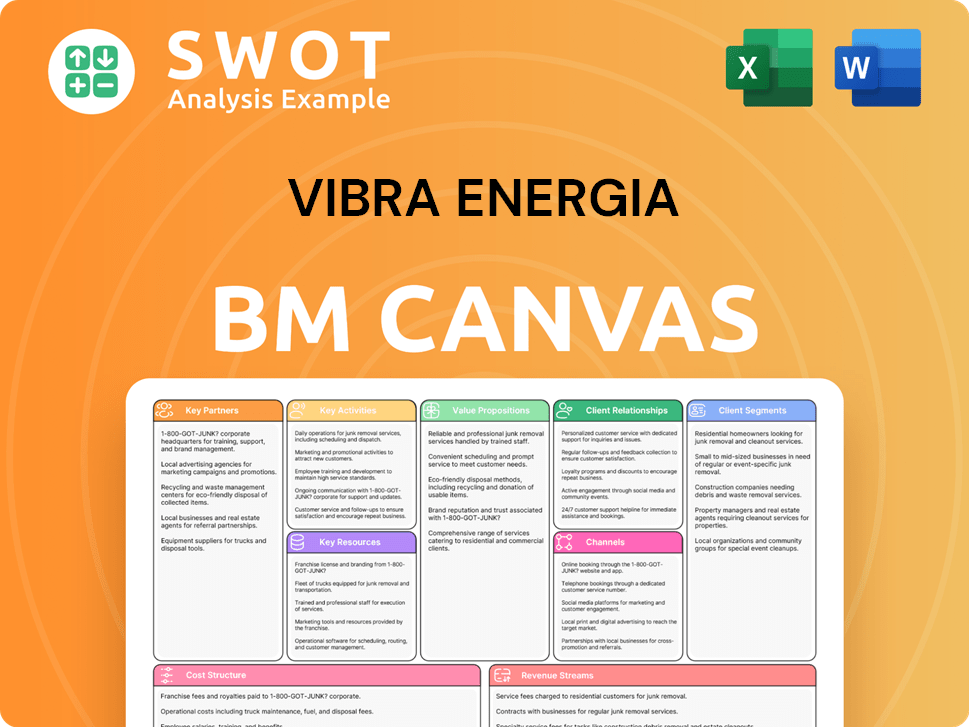
What Risks Could Slow Vibra Energia’s Growth?
Despite its strong position in the Brazilian market, Vibra Energia faces several potential risks and obstacles that could affect its future. These challenges range from intense competition within the energy sector to the complexities of regulatory changes and supply chain vulnerabilities. Understanding these risks is crucial for evaluating the company's long-term growth strategy and its ability to maintain its leading position.
The company's success hinges on its ability to navigate these challenges effectively. Factors such as technological advancements, internal resource constraints, and the integration of new acquisitions all play a significant role in shaping Vibra Energia's trajectory. A proactive approach to risk management and strategic planning is essential for sustained growth.
Vibra Energia's future prospects are closely tied to its ability to adapt and innovate within a rapidly evolving energy landscape. Its strategic decisions regarding renewable energy, electromobility, and operational efficiency will be critical in determining its long-term success and its impact on the Brazilian economy. For a deeper dive into the company's approach, consider exploring the Marketing Strategy of Vibra Energia.
Vibra Energia operates in a highly competitive market. Competitors like Ipiranga and Raízen hold a substantial share of the fuel market. In 2023, Vibra held a 24.1% market share of gasoline sales, indicating the need for continuous strategic efforts to maintain its leading position.
The Brazilian energy sector is subject to evolving regulations, especially concerning environmental policies. Changes in government policies can impact the profitability of new ventures. The liberalization of the electricity market adds both opportunities and regulatory uncertainties.
Supply chain vulnerabilities, particularly for fuel and lubricant distribution, are inherent risks. Fluctuations in global oil prices and supply disruptions can affect operational costs. Maintaining efficiency across its extensive logistics network, including 92 fuel storage bases, is crucial.
Rapid advancements in renewable energy and electric vehicles pose a risk if Vibra cannot keep pace. The increasing share of electric vehicles could reduce demand for traditional fuels. Vibra is investing in electromobility, but the pace of this transition is a key factor.
Internal resource constraints, such as the need for specialized talent in new energy segments, present operational challenges. The integration of new acquisitions, like Comerc Energia, also requires careful management. The company's net debt leverage is expected to peak near 2.5 times by the end of 2025.
The irregular fuel market in Brazil poses a significant threat. It is estimated to total up to 13 billion liters annually. This leads to considerable tax losses and negatively impacts legitimate distributors, creating an uneven playing field for Vibra Energia.
Vibra Energia addresses these risks through diversification and robust risk management. The company's proactive investments in renewable energy and focus on operational efficiency are key strategies. These measures help in mitigating the impact of market fluctuations and regulatory changes.
Prudent financial management is essential, especially with the expected peak in net debt leverage. Careful financial planning and monitoring are crucial to ensure the company's financial stability. Managing debt effectively is critical for long-term sustainability.
Vibra Energia Porter's Five Forces Analysis
- Covers All 5 Competitive Forces in Detail
- Structured for Consultants, Students, and Founders
- 100% Editable in Microsoft Word & Excel
- Instant Digital Download – Use Immediately
- Compatible with Mac & PC – Fully Unlocked
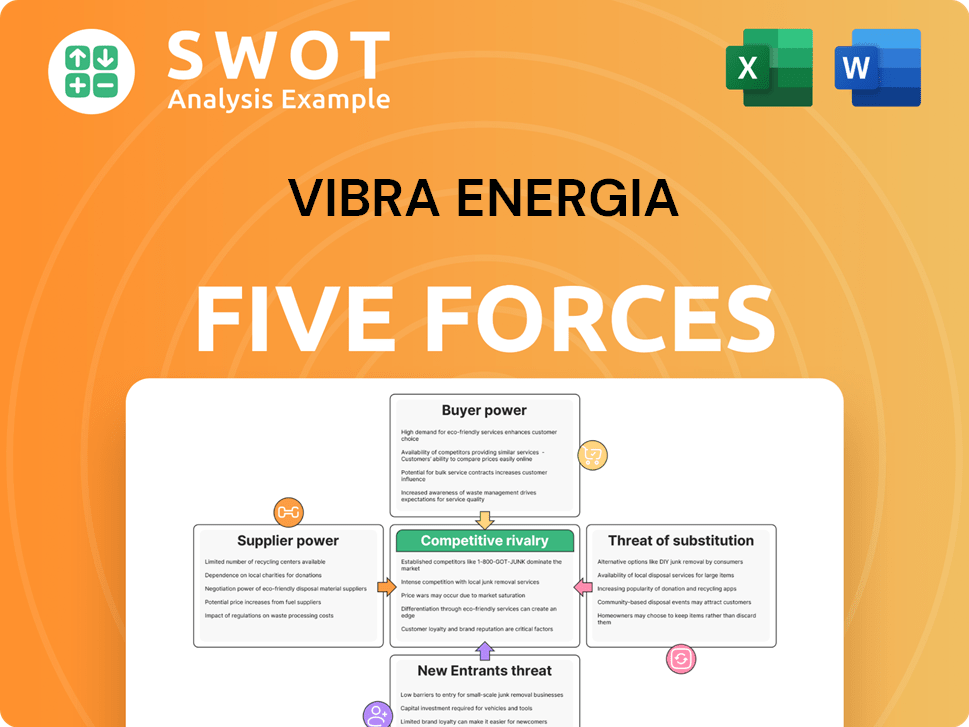
Related Blogs
- What are Mission Vision & Core Values of Vibra Energia Company?
- What is Competitive Landscape of Vibra Energia Company?
- How Does Vibra Energia Company Work?
- What is Sales and Marketing Strategy of Vibra Energia Company?
- What is Brief History of Vibra Energia Company?
- Who Owns Vibra Energia Company?
- What is Customer Demographics and Target Market of Vibra Energia Company?
Disclaimer
All information, articles, and product details provided on this website are for general informational and educational purposes only. We do not claim any ownership over, nor do we intend to infringe upon, any trademarks, copyrights, logos, brand names, or other intellectual property mentioned or depicted on this site. Such intellectual property remains the property of its respective owners, and any references here are made solely for identification or informational purposes, without implying any affiliation, endorsement, or partnership.
We make no representations or warranties, express or implied, regarding the accuracy, completeness, or suitability of any content or products presented. Nothing on this website should be construed as legal, tax, investment, financial, medical, or other professional advice. In addition, no part of this site—including articles or product references—constitutes a solicitation, recommendation, endorsement, advertisement, or offer to buy or sell any securities, franchises, or other financial instruments, particularly in jurisdictions where such activity would be unlawful.
All content is of a general nature and may not address the specific circumstances of any individual or entity. It is not a substitute for professional advice or services. Any actions you take based on the information provided here are strictly at your own risk. You accept full responsibility for any decisions or outcomes arising from your use of this website and agree to release us from any liability in connection with your use of, or reliance upon, the content or products found herein.